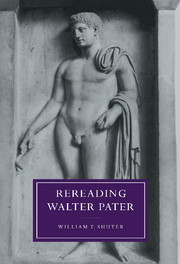Book contents
- Frontmatter
- Contents
- Preface
- Frequently cited sources and abbreviations
- Introduction: an initial reading
- 1 The periegetic critic and the imaginative sense of place
- 2 The retrojective apologist
- 3 Heraclitus, Hegel, and Plato
- 4 The dubious academic
- 5 Visiting the dead
- Conclusion: rereading, revising, and reshuffling
- Notes
- Bibliography
- Index
- Miscellaneous Endmatter
2 - The retrojective apologist
Published online by Cambridge University Press: 22 October 2009
- Frontmatter
- Contents
- Preface
- Frequently cited sources and abbreviations
- Introduction: an initial reading
- 1 The periegetic critic and the imaginative sense of place
- 2 The retrojective apologist
- 3 Heraclitus, Hegel, and Plato
- 4 The dubious academic
- 5 Visiting the dead
- Conclusion: rereading, revising, and reshuffling
- Notes
- Bibliography
- Index
- Miscellaneous Endmatter
Summary
We may begin our rereading of the change in Pater's religious views by considering the change in his prose style. The unreprinted pieces that Shadwell collected after Pater's death under the title Miscellaneous Studies contained material written at very different times. It included, for example, the first known example of Pater's prose, “Diaphaneite” (1864), as well as the last piece on which Pater is known to have worked, the unfinished lecture on Pascal (1894). This fact was noted by Edward Everett Hale in his review of the volume and occasioned his still instructive discussion of the differences between Pater's early and late style. So great was the change that many who admired The Renaissance for its style were, Hale supposes, impatient and disappointed with Plato and Platonism. Contrasting a passage from “Pascal” with a passage from “Diaphaneitè,” Hale notes that the sentences of the early piece – short, uncomplicated predications – amount in effect to “clear-cut and authoritative” generalizations, whereas those of the late piece rather resemble “approximations to the right idea, second thoughts, assumptions, queries rather than questions, personal experience, remarks, the whole aiming to leave us in a state, not of certainty, but of prepossession.”
Compared with Pater's later style, the early manner – illustrated even by the often quoted utterances of the “Conclusion” – seems “somewhat trenchant” and harsh with its “serried phalanx of sentences, each one stiff and rigid, sharp and polished, like a spear stuck up in the air.” “Not the fruit of experience, but experience itself, is the end.”
- Type
- Chapter
- Information
- Rereading Walter Pater , pp. 39 - 60Publisher: Cambridge University PressPrint publication year: 1997

